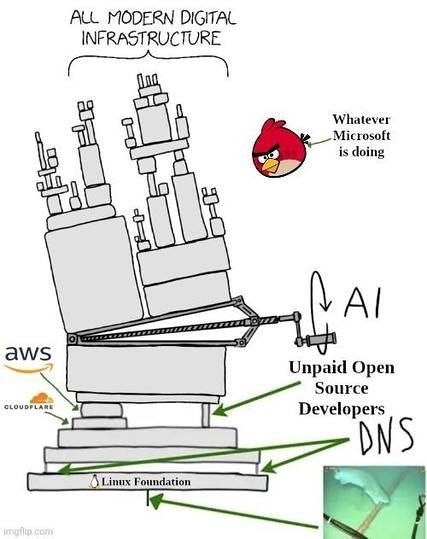
Posted on 11/21/2025 1:19:13 AM PST by CIB-173RDABN
The hype surrounding Y2K was because no one knew what could really happen. It ended up being a relatively simple — though time-consuming and costly — fix because programmers knew exactly what the problem was and how to solve it. In the future, if a major system goes down, they might not know what the problem is or how to fix it. That’s the scary part.
You're quite right in your comments about Y2K -- I was one of those techies who spend scores of hours finding and fixing all the places where the clock would step on itself. Unfortunately the modern internet doesn't lend itself to that kind of pre-emptive fix. The next big one that -is- predictable is the 32-bit unsigned int Unix clock rollover in 2038, but most modern OSes use a 64-bit representation these days.
Someday, and hopefully not too soon, Americans will be able to say how fortunate we’ve been all of this time to have had the United States Space Force on our side.
I spent over a year working on Y2K for a company, from inventorying to code fixing to system testing. There were literally hundreds of programs and thousands of lines of code involved, any one of which was a production killer. It was no myth or false alarm. Most people didn’t have to worry about it though, and weren’t even aware of the crisis, unless they thought it was overhyped. It was probably the most stressful and overworked year of my life.
Cloudflare’s issue was configuration mismanagement, something that proper pipelining and regression testing should have caught.
Y2K was a known issue that was caught very early and mitigated quickly with little fanfare. I remember Y2K very well, being on-call and alert on NYE waiting for planes to fall from the sky, which never happened.
AWS and Azure outages recently were both due to DNS which is a bigger problem, IMO. DNS is very old tech, and the people who know it deeply and can wrap their brain around a very tangled global web are aging out of the workforce. Those of us with deep tribal knowledge are being told we’re being replaced by AI. As I approach retirement age, I’m going to sit back with some iced tea and a cigar and watch as the youngins with zero exposure or experience with DNS fumble with it when a serious outage occurs taking us down for days, not just hours.
True.
As I approach retirement age, I’m going to sit back with some iced tea and a cigar and watch as the youngins with zero exposure or experience with DNS fumble with it when a serious outage occurs taking us down for days, not just hours.
—
I am retired and have had a lot of time to think about this. I was a service technician for over 30 years. The equipment I worked on changed over time but the one constant that even with newer more advance equipment there was a lot of the older equipment still in use and needed repair. But I noticed as I got older, and newer, younger techs were hired, they were not interested in learning about the older stuff. It was the older techs like me who kept them working. When I retired there were still a lot of the older stuff out there that the “younger” techs knew nothing about.
The same thing is occurring with programming and the internet, it is a tangle of old and new, and patch work being kept together with hope and a prayer.
Add to this different companies are adding their own unique apps and programs to the system, when the system fails, will anyone know where and why?
Yeah, systems needed to be updated, but Y2K was a massive shakedown by tech industry consultants and service providers.
I mentor a lot of high school and college students. Every one of them is learning about cloud and modern programming. When I ask them about the OSI stack or Active Directory or how DHCP works, they ask, “What’s that?”
We are blessed. Yet I would guess that their tech systems too are hosted on the cloud of the internet of things

Good thing Peter Gibbons and Michael Bolton had the Y2K switchover under control.
Same here. I managed a team that was responsible for correcting the programming across 8 world-scale chemical plants. New Year’s Eve 1999 was spent in a “war room”, monitoring impacts around the world. The champagne at the end was the BEST ever!
I was just going to go grab that, thank you.
Very interesting. Thanks posters.
Y10K is right around the corner. Hope you remember how to code COBOL.
Is COBOL still alive anywhere?
I was not aware of the 2038 problem.
Y2K was a relatively simple (albeit time consuming and expensive fix), I am not sure how the UTC fix is going to be done since I doubt any one really knows what applications are using it and where it is in the code ( I am not a programmers so I may be using the wrong terminology).
This fits my warning. The internet and AI is becoming very necessary evil in our world, but it is also very fragile. One part, one glitch could cause a lot of chaos around the world.
Just wait till you see what a missing or corrupt npm package does. Oh wait. It already did.
Disclaimer: Opinions posted on Free Republic are those of the individual posters and do not necessarily represent the opinion of Free Republic or its management. All materials posted herein are protected by copyright law and the exemption for fair use of copyrighted works.